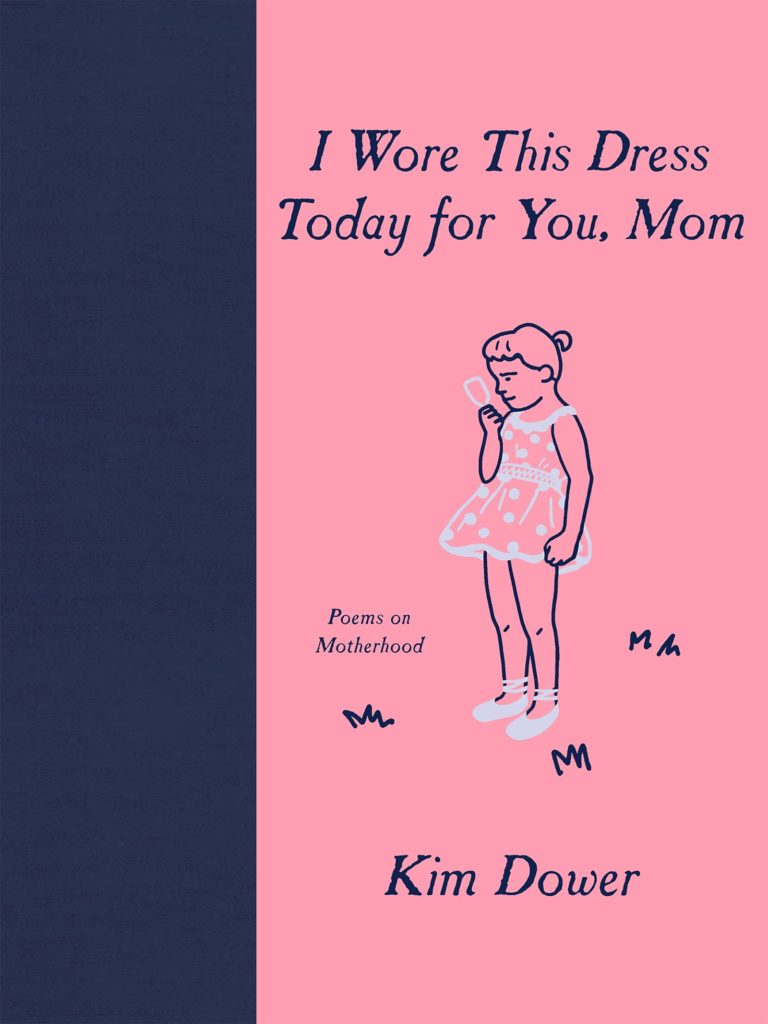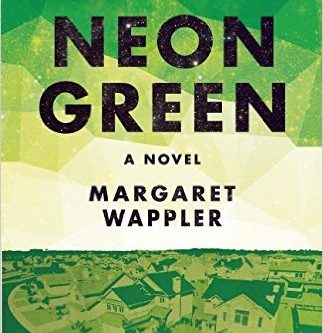
I Wore This Dress Today for You, Mom by Kim Dower
Review by Brian Sonia-Wallace
There are few things more classically Freudian than autobiographical poems about a poet’s relationship with their mother, and this new collection by prolific former West Hollywood City Poet Laureate Kim Dower takes up the challenge deftly: will she become her mother? Is she already her? What continues after death? (Mail, memories, junk). What is broken by death? (Rituals, memories — junk).
The poems in I Wore This Dress Today for You, Mom are casual and conversational in tone, laugh-out-loud funny or tearjerking at their best. A mix of new pieces and motherhood poems from Dower’s former collections, they paint a portrait of urban motherhood rarely seen in verse, a Southern California freeway pastoral blended with a 5th Avenue childhood in New York. Writes Dower:
…My mother
didn’t know about soil or earth worms.
City mothers, we know about bus routes, restaurants,
Broadway, the people on the eighth floor.
Mine taught me to accessorize…”
Tellingly, this poem is entitled, “Different Mothers,” and the whole collection is nuanced by a consistent self-awareness of other possibilities, the “might have beens,” from Dower’s reflections on an imagined daughter to her fear of following in her mother’s footsteps in suffering from dementia. Dower’s mother, a socialite in her day, succumbs to memory loss and helplessness, and many of these poems grapple with the slipperiness of memory, both in childhood and old age.
In her poem “Letter to My Son,” Dower imagines herself in her mother’s shoes, and writes instructively to her son: “Tell me everything’s okay / and I will believe you. Tell me there’s a bird on a branch outside my window, even if there is no window, and I will imagine he’s singing to me.” Dower’s poems inhabit a world self-conscious of its own aging and eventual, inevitable collapse, with the thin narrative of what’s passed down in a family holding the discordant pieces together. Through the examination of motherhood from both ends, as a daughter and as a mother, Dower raises questions about the legacy of learned values and behavior, asking the question: what happens when, with time and distance, the memories we inherit decay?
The physical world comes into play as a doorway into memory. The materiality of sweaters, jewelry, chairs, and the dress of the collection’s title act as an artifact of human presence (“we bought this together” or “these were your things”) and agency (“you liked this, you chose this”). Part of what is stripped away, alongside memory, with dementia is the ability to make choices, and in an odd and very American way, the ability of Dower’s mother to make conscious choices as a consumer become a stand-in for her wellness. The poetry of illness and of kitsch are intertwined here, as the mass-produced material world interacts with and enacts ensouled human existence. In “The Salvation Army Won’t Take the Futon,” what happens to our stuff as we make the move into nursing care echoes what happens to us. In the “I Lost My Mother at Bloomingdales,” we see shopping as a bond:
…what if she vanishes into a refurbished brownstone
stairwell her dress on backwards label showing lost forever after
her last outing shopping with me it’s what we did what we loved until
—the poem finishes, achingly, here, with no punctuation, no resolution. Just the terror of losing your mind.
The title of the collection becomes a reassurance, in this context. “I Wore This Dress Today for You, Mom” a reminder of who the “I” is, who the “you” is, what day we’re on, and the relationship between the speaker and subject (“Mom”), with the dress serving as an anchor to what was once important in that relationship, even if it has long since stopped mattering. The title poem drips with longing, and the speaker, who we get the sense resented the high society New York life her mother so prized, now mother-less and in Los Angeles, finds herself with “a closet filled / with dresses I need to show you.”
These themes of motherhood, framed in an urban pastoral and humanistic materialism, run through these poems, with their attendant anxiety which might also be interpreted as a longing or nostalgia. This is a collection of imagined nature and of the unreliability of memory, pretzels at baseball games and “boiled secrets.” A strong gender commentary pervades the work as well, a through line from women’s’ roles in the 1950’s balanced with writing and bringing up kids, to a visceral set of poems which inhabit and explore Dower’s C-section and her son’s birth as an older woman. Dower returns to earlier themes and motifs from her work as well, in particular the moon, which even here is fragmented, diminished, hanging on too long.
The theme of anxiety around memory extends to Dower’s son, who, as he grows up, becomes someone alienated from her memories of him. Even if memory doesn’t fail us, she seems to say, the world will come to fail our memories of it. But it works the other way too — in “After the Rain,” she says, “although the dead / are gone, the way we think of them / can change.” These everyday poems, with titles like “Scrambling Eggs” and “While Washing the Dinner Dishes,” are a testament to how that change occurs, unobtrusively, in everyday life, as our brains make sense of loss through the continual process of living.
Southern California is a major player in this collection, situating the poems in geographic and mental space, from a poem entitled “The Things I Do In My Car” to one about earthquakes, “Minor Tremors,” where the shifting, uncertain landscape of California mirrors the mental landscape of a child coping with the loss of a parent. Perhaps my favorite in the collection is the laugh-out-loud funny piece “Bottled Water,” which contains such lines as ‘If I drink smartwater / will I raise my IQ but be less authentic?”
Dower is on form in this collection — both smart and authentic, with enough snark and humor to keep things from getting too, well, dour. Don’t let the serious themes fool you, there’s plenty of irrelevance at play here, too. Dower ends the poem “My Mother Bakes Sugar Cookies” with the lines:
The people in charge of Heaven
sound so thoughtful, I tell her.
Well, they’re angels,
she says,
but not like you’d imagine.
Sure, they wear white,
have wings,
smile sweetly
but they all talk way too much
and their asses
are huge.
Dower is a master of tonal shifts and irony, and uses dialogue to great effect. In the next poem, “Why We Dream,” her mother tells her, “I’m not dead…/ I’m going to the Opera!” It’s the mark of a great poet that, in speaking about the dead, Dower gives us such a vivid sense of life.
I Wore This Dress Today for You, Mom is available now through Red Hen Press
Brian Sonia-Wallace is the author of The Poetry of Strangers (Harper Collins), winner of the 2020-23 West Hollywood City Poet Laureateship, and a national 2021 Laureate Fellow for the Academy of American Poets. His work has appeared in The Guardian, Rolling Stone, Poets.org, Rattle, and more. He teaches at the UCLA Extension Writers’ Program and Get Lit – Words Ignite. More at briansoniawallace.com and @rentpoet.



